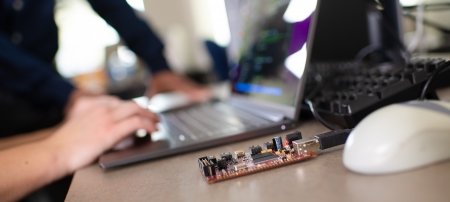The technology of the future is here—but is it safe? Professor and cyber-security expert Shiyan Hu tells us how to be security savvy in a technology-smart world.
The technology of the Jetsons is here. Smartphones are just the beginning: Already, a number of "Smart Home" appliances are available. That's right, your thermostat, fridge, and washing machine could be as much of a smarty-pants as your tablet.
But with that convenience comes increased security risks.

Shiyan Hu is an associate professor of electrical and computer engineering and he studies cyber-security. Every digital link between smart appliances and you, Hu says, is a pathway for hackers to take over your house, maybe even your community. And as all aspects of life become more digitally connected, we increase the risk of serious hacking threats.
"We cannot have perfect security for smart devices," Hu says. "But we can make improvements."
So, how can you increase your own cyber-security? Hu has several recommendations.
Top Troublemakers
Ooh! A brand-new pony, I'd buy that!
You found the perfect set of glow-in-the-dark My Little Pony figurines—score! But before you click to submit that payment, think before you buy. Hu says online buying is one of the most common security issues.

Some tips to keep your data secure:
- Avoid open networks.
More-secure networks require signing in with a passcode. - Use websites that encrypt your information.
Scrambled data is harder to break into—look for a little padlock up by the URL address. - Watch out for auto bill pay.
Especially with smart appliances, unnoticed energy spikes get swept under the rug if you don't monitor your accounts.
Hmmm, I wonder where that link goes.
That email from Aunt Betsy? No, she really isn't in London and she doesn't need you to send over a thousand quid. If you have any doubt about the validity of a link, email, or Facebook message, check it out:
- Hover over the link.
Does it match where it says it goes? - Ask where it came from.
Call Aunt Betsy—"You went to London and didn't tell me?" - Report it.
Especially for work accounts, companies have a way for you to let IT and others know about potential hacks.
Dang! What was my password again?
Don't use your favorite cereal and birth year for every single password. While you may remember cornflakes1970, it's crummy security. So is repeating a single password or writing down multiples. "And there are so many passwords to remember!" Hu exclaims. "If it's simple, it's easy to guess, but if it's complex it's hard to remember." Try this for balance:

- Use the first letter of each word in the opening line of a song you know.
ittrl1970 is the opening of Queen's "Bohemian Rhapsody". - Choose a couple of capital letters.
IttRL1970 - Avoid strings of numbers.
19IttRL70 - Mix in some punctuation.
19IttRL.70 — now that's a safe password, and you can probably remember it.
Michigan Technological University is an R1 public research university founded in 1885 in Houghton, and is home to nearly 7,500 students from more than 60 countries around the world. Consistently ranked among the best universities in the country for return on investment, Michigan's flagship technological university offers more than 120 undergraduate and graduate degree programs in science and technology, engineering, computing, forestry, business, health professions, humanities, mathematics, social sciences, and the arts. The rural campus is situated just miles from Lake Superior in Michigan's Upper Peninsula, offering year-round opportunities for outdoor adventure.




